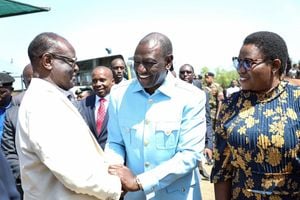County budgets agenda faces Githae

Photo|DIANA NGILA|NATION
Finance Minister Robinson Njeru Githae after the official opening of Visa offices in Kenya at Riversde 14 on May 5, 2012
The quest for devolution will be top of the list of things that Finance minister Njeru Githae will consider when he reads a ministerial statement on the Budget — the equivalent of the Budget Speech — to the House on Thursday.
But as he does that, the minister will have to explain to MPs why he scaled down the money set aside for the counties by a colossal Sh18.7 billion.
In the estimates to Parliament, Mr Githae had given a figure of Sh148 billion for devolved functions, yet he had promised MPs, through the Budget Policy Statement, that the amount for devolution would be Sh166.7 billion. That “notable gap” is what MPs will be keen to see how the minister explains away.
Mr Githae will also be expected to say if he agrees with a proposal from the powerful House Budget Committee to use part of the money in the Treasury’s budget to build offices for the county governments and spruce up other buildings that will, for example, host the bureaucracy in the counties and the county assemblies.
The MPs are targeting Sh1.5 billion that was allocated to the Ministry of Finance under “transfers for constitutional reforms” to have it earmarked for building county assemblies.
“Failure to fully provide specific funds for setting up County Assembly structures will result in County legislatures being unable to execute their mandates immediately after the next General Election,” the Budget Committee, led by Mr Elias Mbau (Maragwa) said in their report to Parliament.
This year’s budget will be crucial for laying the foundation for devolution of power and resources to the counties. It comes against a backdrop of suspicion from Parliament that there were people in government hell-bent on frustrating the rollout of devolved units.
The scepticism is fuelled by the legal limbo that has made it impossible for Parliament to approve the County Governments Bill and the Public Financial Management Bill (PFM), the two laws, which if passed, will set up the bureaucracy in the counties and guide how the money sent to the counties will be used.
The two Bills are time-barred as per the constitutional deadlines of February 27, 2012. The government has failed to rally 148 MPs to approve the extension as prescribed in the Constitution on two occasions that it tried to extend the deadline.
The County Government Bill had already been approved but when it was taken to President Kibaki for assent, he rejected it and told MPs that they were encroaching on his mandate in seeking to lock the provincial administration under the governor’s office.
That amendment is pending in the House, and if MPs don’t agree with it, they will have to raise 148 MPs to force the Head of State to append his signature. The PFM Bill is at the debate stage.
Two other Bills, the Division of Revenue Bill and the County Revenue Allocation Bill, are also top of the MPs’ list of priority laws, but these have not been published and are still very nascent in the legislative process.
MPs have demanded that these two be in place so that the 15 per cent minimum allocation to the 47 counties can be worked out using a legal basis.
The minister will have to explain to the MPs the status of these two Bills even with the controversial proposal from the Commission on Revenue Allocation on how the county revenues will be shared currently pending in Parliament.
While Mr Githae and his colleagues in Cabinet have vowed to ensure that devolution takes place as envisaged in the Constitution, MPs are wary that the huge debts of the existing local authorities may be taken over by county governments, and therefore cripple the delivery of key services to residents in the counties.
Transition Authority
According to the minister, the onus will be on the Transition Authority — the team to map out how Kenya will move from a centralised government to a devolved one — to decide how those debts will be dealt with.
There’s also the training of officers to be seconded to the counties to manage the county treasuries. Such a matter will be key for MPs as they will inevitably seek to be told if these people will be reporting to Nairobi or to the governor.
The fate of the CDF is also on the minister’s plate, as he will be expected to explain in detail how CDF will work under the new Constitution.
The minister will have to do so knowing that MPs have already adopted a report calling on him to ensure that half of the money he’ll allocate to CDF in the next financial year (2012/2013) should be in the constituencies by end of September this year.
The MPs have also asked the minister to make sure that Sh562 million in arrears to the CDF should also be released as soon as he reads the Budget. The MPs believe that the minister, if he gets serious about the collection of taxes, can make enough money to pay for the arrears.




